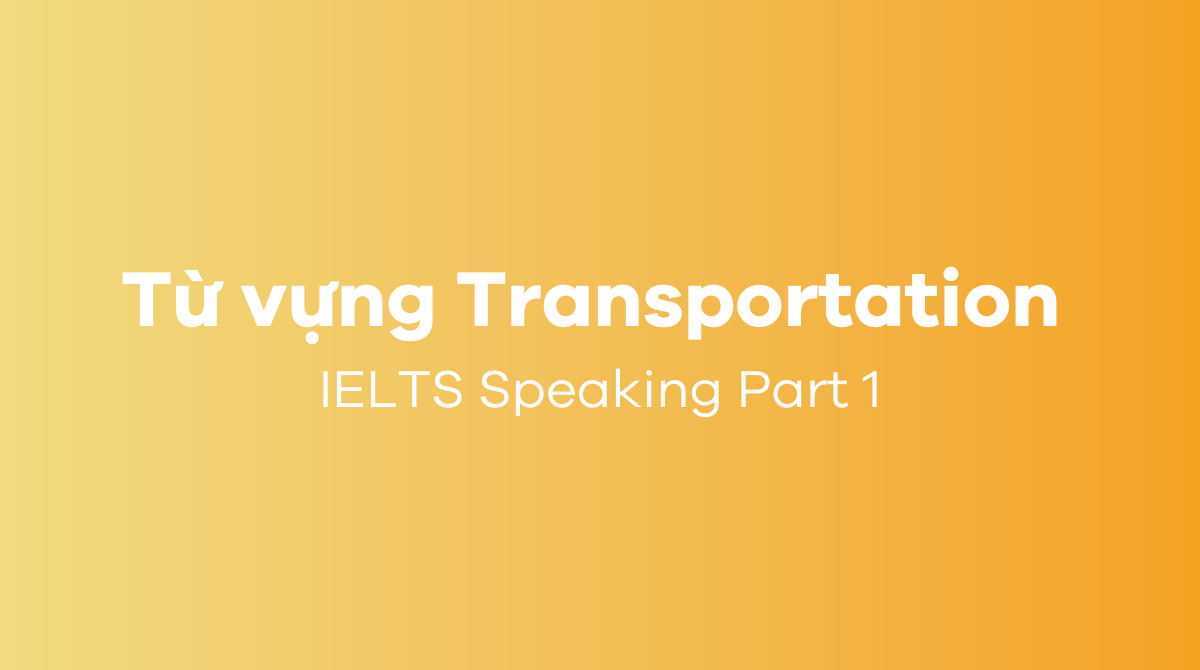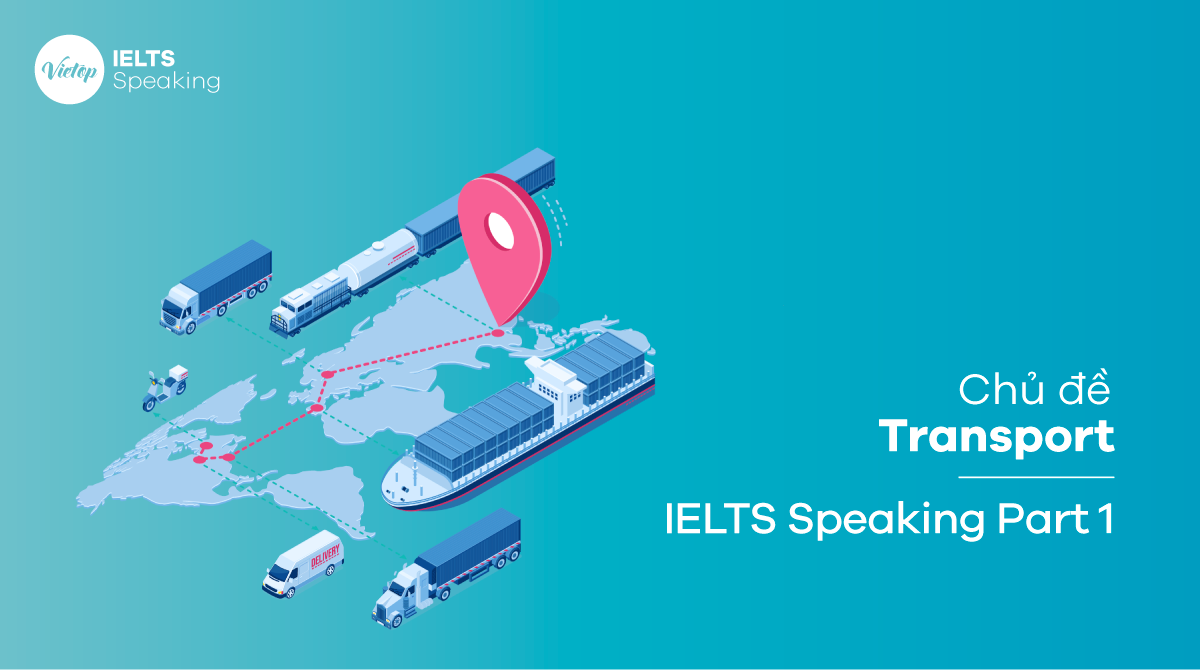Chủ đề Transportation (Giao thông) là một trong những chủ đề quen thuộc thường thấy trong dạng đề IELTS Speaking Part 1. Tuy nhiên, để có thể làm tốt phần thi này, thí sinh cần có vốn từ vựng nhất định về chủ đề cũng như luyện phản xạ tạo thành một câu hoàn chỉnh.
Vì vậy, hôm nay Vietop sẽ cung cấp cho các bạn tham khảo bài mẫu Topic Transportation IELTS Speaking part 1.
Từ vựng topic Transportation IELTS Speaking part 1

| Từ vựng | Tạm dịch |
| Congestion | (n) tắc nghẽn giao thông |
| High traffic volume | (n) lưu lượng xe lớn |
| Traffic safety | (n) an toàn giao hông |
| Traffic signs/ traffic lights | (n) biển báo giao thông/đèn giao thông |
| Chaos | (n) sự hỗ loạn |
| Time-wasting | (adj) lãng phí thời gian |
| Road junctions | (n) nút giao thông |
| Rush hours | (n) giờ cao điểm |
| Off-peak hours | (n) giờ vắn khách |
| Crosswalk | (n) vạch qua đường |
| Pavements | (n) vỉa hè |
| Public transportation | (n) phương tiện công cộng |
| Transport infrastructure | (n) cơ sở hạ tầng giao thông |
| Commute | (n) di chuyển, thường dùng cho quãng đường từ nhà tới nơi làm việc |
| Ease traffic flow | (v) giảm bởi lưu lượng giao thông |
| Traffic wardens | (n) nhân viên kiểm soát giao thông |
| Emit/release | (v) phát thải |
| Exhaust emissions | (n) khí thải |
| Respiratory problems | (n) các vấn đề về đường hô hấp |
Xem thêm:
Bài mẫu Staying up late IELTS Speaking Part 1

Nhận tư vấn miễn phí khóa học hè
Bài mẫu topic Transportation IELTS Speaking part 1

Mời mọi người nghe Audio topic Transportation part 1 tại đây nhé!
1. What form of transport do you prefer to use? Why?
Motorcycles, I would say without a doubt. In my country, motorbike riders may be seen riding all over the place. The majority of people commute by motorcycle. The reason why motorbikes are so popular is owing to their reasonable pricing and convenience. They are also incredibly diverse in terms of size, color, and quality, offering a wide range of options for everyone.
- Commute (v): đi lại
- Owing to: do, bởi vì
- Reasonable (adj): hợp lý
- Incredibly (adv): vô cùng
- Diverse (adj): đa dạng
- In terms of: xét về
Luyện tập IELTS Speaking với bài mẫu IELTS Speaking part 1 và IELTS Speaking part 2 nhé!
2. How often do you take buses?
Nearly everyday. Since my house is so far away from my institution, it’s impossible for me to travel by motorbike. Additionally, there is constant traffic, particularly during rush hours, and the air is significantly contaminated by exhaust fumes. So, in order to save time, money, and to contribute less to pollution, I’d rather take the bus.
- Institution (n): tổ chức, công ty
- Constant (adj): liên tục, không ngừng nghỉ
- Rush hours (n): giờ cao điểm
- Contaminated (adj): bị ô nhiễm
- Exhaust fumes (n): khí thải
- Contribute (v): góp phần
Bạn muốn cải thiện kỹ năng Speaking với những tips và chiến thuật trả lời giúp ghi điểm với ban giám khảo. Khoá luyện IELTS 3.0 – 5.0 của IELTS Vietop – nơi mang đến cho bạn lộ trình học cá nhân hoá, không chỉ tự tin chinh phục ban giám khảo trong phòng thi mà còn vận dụng được kiến thức thật trong đời sống thực tế.
3. Can you compare the advantages of planes and trains?
Trains and aircraft frequently leave and arrive on time. Additionally, there are numerous practical facilities that appeal in particular to different passenger groups. Traveling by train gives you the opportunity to observe the outside world and take in the views from your seat, while traveling by airline is undoubtedly more convenient and enjoyable in terms of onboard amenities like food or comfortable seats. For the majority of train passengers, it’s an excellent experience.
- Aircraft (n): phi cơ, máy bay
- Numerous practical facilities (n): nhiều cơ sở vật chất
- Appeal (v): bắt mắt, thu hút
- Observe (v): quan sát
- Onboard amenities (n): dịch vụ tiện nghi trên máy bay
Xem ngay: Khóa học IELTS Cấp tốc – Cam kết tăng ít nhất 0.5 – 1.0 band score SAU 1 THÁNG HỌC
4. How much time do you spend traveling on a normal day?
Every day, I have to travel to and from my place of employment. I typically travel back and forth in 20 minutes.
- Back and forth: qua lại
5. Would you ride bikes to work in the future?
Absolutely not. You expose yourself to erratic weather and air pollution when you ride a bike. The main thoroughfares or the highway, where vehicles, motorcycles, and buses will be traveling at a fast rate of speed, are worse, I’m afraid. Therefore, I’d like to ride a motorcycle or take the bus.
- Expose yourself to (v): khiến cho bản thân dính dáng tới
- Erratic weather: thời tiết thất thường
- Thoroughfares (n): đại lộ
6. What will become the most popular means of transport in your country?
Buses, in my opinion, will take the lead. Without much concern for the cost of the ticket or the inclement weather outside, you can traverse the distance. Additionally, modern buses now provide superior amenities including good air conditioning systems and comfy seats for the elderly.
- Take the lead (v): dẫn đầu
- Inclement (adj): khắc nghiệt
- Traverse (v): đi qua
- Superior amenities (n): dịch vụ tiện nghi cao cấp
- Comfy seats (n): chỗ ngồi thoải mái
Xem thêm: Bảng chữ cái tiếng Anh
7. Do you prefer public transport or private transport?
I believe I’d choose public transportation. It is far less expensive, and because it can hold a lot of people, it lessens the severity of traffic congestion during peak hours and lowers greenhouse gas emissions from moving automobiles. The price of gasoline, fees, and other costs are higher when using private transportation.
- Severity (n): mức độ nghiêm trọng
- Traffic congestion (n): ùn tắc giao thông
- Peak hours (n): giờ cao điểm
8. What are the differences about transportation in your country between the past and now?
Over the past few years, transportation in my nation has undergone substantial development. Due to two conflicts in the past, people virtually exclusively used motorbikes and bicycles for mobility. However, economic growth has led to a huge increase in car ownership in Vietnam today. I believe that most individuals will utilize vehicles daily in the future.
- Undergone substantial development: trải qua sự phát triển đáng kể
- Mobility (n): tính cơ động
9. What type of public transport can be found in your city?
Buses and taxi motorbikes are the most widely used modes of public transportation in my city. You know, several lines in my city are being built for high-way trains. This sort of transportation would debut for the first time in Vietnam.
- Highway trains (n): tàu cao tốc
- Debut (v): ra mắt
10. Are there any transport problems in your city?
Undoubtedly, traffic congestion is Hanoi’s largest issue, especially during rush hour when there are typically enormous queues of cars on the road. It’s a complete waste of time and money, in my opinion.
- Enormous (adj): lớn
Xem thêm:
Bài mẫu topic Watch IELTS Speaking part 1
11. How would we improve that problem?
In all honesty, it’s a challenging question. But I think that if we could, we should take public transportation rather than our personal vehicles. Because studies indicate that too many cars on the road cause 70% of traffic accidents. The government should also set aside additional funds for modernizing the road system.
- In all honesty: Nói một cách trung thực
- Challenging question: câu hỏi khó khăn
- Indicate (v): biểu thị
- Set aside additional funds for modernizing the road system: dành thêm kinh phí cho việc hiện đại hóa hệ thống đường bộ
12. Did you take public transportation when you were a kid?
I’d reply “no.” There wasn’t a mass transit system in Thanh Hoa when I was growing up because it was a little underdeveloped at the time. So, the only information I had about ‘public transportation’ came from the media. Back then, I even daydreamed about taking a bus or a train to get somewhere, but I didn’t get my first bus or anything until I moved to Hanoi to attend university.
- Mass transit system (n): hệ thống giao thông công cộng
- Underdeveloped (Adj): kém phát triển
- Daydream about (v): mơ mộng về
- Attend university (v): đi học đại học
13. Will there be more people taking public transportation in the future?
It’s difficult to forecast whether public transportation will be used more in the future based on how it is currently used. But to be completely honest, I wish more people would use metro transit. Public transportation, in my opinion, is the only method to stop global warming and environmental damage since the Earth is warming and getting more and more uninhabitable.
- Metro transit (n): tàu điện ngầm
- Global warming (n): sự nóng lên toàn cầu
- Environmental damage (n): thiệt hại về môi trường
- Uninhabitable (adj): không thể ở được
14. Do you think people should use public transport more
Absolutely yes. We should use environmentally-friendly transportations more so that we could mitigate air pollution. I mean that instead of travelling by our own vehicles like cars or motorbikes, we should start with the usage of public transport like buses.
- Environmentally-friendly /ɪn.vaɪ.rənˌmen.təl.i ˈfrend.li/ (adj): thân thiện với môi trường
- Mitigate something /ˈmɪt.ɪ.ɡeɪt/ (verb): giảm thiểu cái gì
- Air pollution /ˈeə pəˌluː.ʃən/ (noun): sự ô nhiễm môi trường
Hy vọng rằng, qua bài viết này, các bạn đã có thêm nguồn từ vựng cũng như ý tưởng để áp dụng vào phần bài thi nói của mình thuộc chủ đề Transportation IELTS Speaking part 1. Vietop chúc bạn chinh phục IELTS Speaking thành công!











